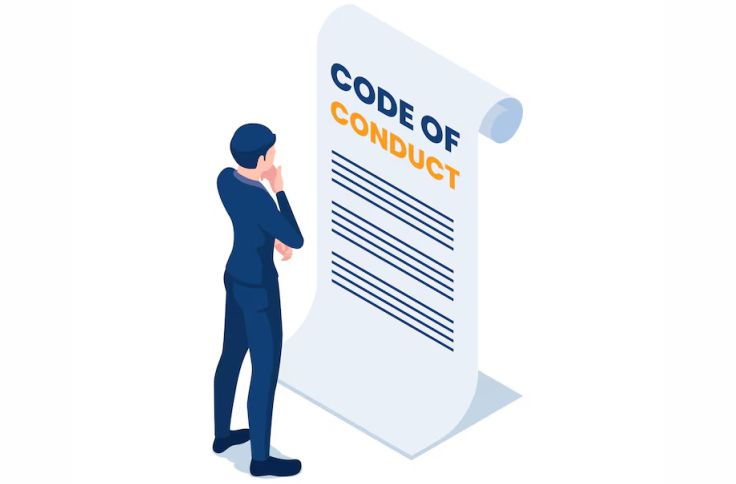Your conduct shapes your life, every decision, relationship, and path you take. When it’s misaligned, life feels off-balance. What is conduct, its types, and consequences?
Conduct shapes the way you interact with your environment, guiding choices, actions, and relationships.
As the foundation of behavior and living, human conduct reflects personal values, societal expectations, and internal discipline.
Whether expressed through daily habits, social behavior, or moral decisions, conduct plays a chief role in personal development and social harmony.
It influences how people respond to challenges, communicate, and maintain integrity in various settings.
Across cultures and communities, healthy conduct encourages trust, respect, and cooperation, serving as the backbone of functional societies.
Understanding what drives and molds human conduct allows for a deeper grasp of human nature and the building blocks of responsible living.
In an increasingly complex society, exploring conduct provides valuable insight into the forces that shape behavior and the standards that define meaningful, purpose-driven lives.
Let’s take a closer look:
Recommended: 10 Personal Conduct that Shape Your Destiny

Main Points
- Conduct refers to both personal behavior and guidance, influencing interactions and leadership, shaping both individual growth and success.
- Personal conduct reflects your character, values, and decisions, impacting relationships and perceptions in everyday situations.
- Leadership conduct involves guiding and motivating others through example, fostering trust, respect, and achieving collective goals.
- Conduct varies in personal, social, professional, cultural, and spiritual contexts, shaping interactions and contributing to societal harmony.
- The consequences of conduct, whether positive or negative, influence reputation, opportunities, and legacy, impacting personal and professional growth.
What is Conduct?
Conduct holds a chiefly place in both personal and professional life, yet it can be understood in two different lights. On one hand, conduct represents your behavior, reflecting how you act in various situations.
On the other hand, conduct also refers to guidance, particularly in leadership contexts, influencing how you direct or influence others.
These two dimensions of conduct shape not only your interactions but also the direction of your life, which is achieved through personal growth and success.
Let’s explore these meanings in more detail.
Conduct as Behavior
Conduct in this sense refers to the actions and decisions you make daily. It reflects your character, values, and personality, influencing how others perceive and interact with you.
Whether it’s the way you respond in a conflict or the choices you make in everyday situations, your behavior reveals your intentions and shapes your life’s path.
Conduct as Guidance
In leadership, conduct represents the way you guide, influence, and motivate others. It’s about setting an example through actions that inspire trust, respect, and cooperation.
Effective conduct in leadership drives positive outcomes, helps shape organizational culture, and steers collective efforts toward shared goals, ultimately impacting success and growth.
Related: Confidence – Everything You Need to Know
The Types and Pillars of Conduct

We have mentioned that conduct is at play in shaping how you engage with the world around you and every area of your life, from personal relationships to professional success and societal involvement.
Understanding the different types of conduct helps clarify how your behavior can impact your growth and interactions with others.
Let’s explore the key pillars of conduct.
1. Personal Conduct
Your conduct is at the core of how you behave and interact with others. It influences your actions, decisions, and relationships.
How you carry yourself, through your ethics, integrity, and emotional intelligence, shapes your trustworthiness and respectability.
Emotional intelligence helps you manage your emotions and understand others, leading to stronger, more empathetic connections.
Human conduct sets the tone for how you relate to the people and situations around you.
2. Social Conduct
Social conduct determines how you interact with your community and the broader society.
It’s shaped by social norms, cultural values, and how well you communicate with others.
Good social conduct means respecting boundaries, showing kindness, and fostering cooperation.
Understanding social expectations allows you to blend in and contribute to a harmonious community.
How you connect with others in public spaces and among different groups plays a key role in your social standing.
3. Professional Conduct
Professional conduct is the standard of behavior expected in the workplace. It’s about more than just following rules, it’s about being accountable, transparent, and reliable.
How you conduct yourself at work affects your relationships with colleagues, clients, and employers.
Strong professional conduct builds a reputation for integrity and competence, paving the way for career growth and a positive work environment.
By maintaining professional conduct, you contribute to a thriving, respectful workplace culture.
4. Cultural and Societal Conduct
Your cultural and societal conduct reflects the values and norms you uphold in different settings.
Understanding and respecting diverse cultures is key to fostering inclusivity. It encourages meaningful dialogue and cooperation among people from different backgrounds.
Your role in society goes beyond personal interactions; how you engage with social justice, community service, and civic duties also reflects your societal conduct.
Embracing these values helps build a more united and understanding world.
5. Spiritual and Philosophical Conduct
Spiritual and philosophical conduct is shaped by your beliefs and values, which influence how you approach life’s challenges and moral decisions.
Whether guided by religion, philosophy, or personal principles, this type of conduct helps you navigate ethical dilemmas with reflection and growth.
By aligning your actions with your inner values, you develop a deeper sense of purpose and strengthen your connection with others.
This introspection can lead to a more meaningful life, grounded in wisdom and empathy.
Related Posts
Emerson’s View on Fate in The Conduct of Life
Emerson’s Secrets To Life’s Journey
Personal Agency: How To Take Control of Your Life
The Power of Emotions and How to Respond to Them
Morals vs Ethics: How Do They Differ?
How Human Conduct is Expressed

Human conduct influences communication, relationships, and decision-making.
Understanding the various ways conduct is expressed: verbal, nonverbal, conscious, unconscious, and digital, helps improve communication and encourages better leadership and connections in modern society.
Let’s take a closer look:
Verbal Conduct
Verbal conduct includes everything you say, whether in speech or writing. It’s about the words you choose, your tone, and how you present your ideas.
Clear and respectful communication helps convey your thoughts and emotions effectively.
Verbal conduct also helps build trust, establish rapport, and prevent misunderstandings.
In professional settings, the way you communicate impacts how others perceive you and can make a significant difference in achieving success.
Whether in meetings, emails, or casual conversations, maintaining positive verbal conduct is essential for maintaining strong relationships and promoting collaboration.
Nonverbal Conduct
Nonverbal conduct includes all the physical cues you use during communication, such as body language, facial expressions, and gestures.
These nonverbal signals often convey emotions, attitudes, and intentions more directly than words.
For instance, a warm smile or open body posture can create a welcoming atmosphere, while crossed arms or a frown may indicate disinterest or discomfort.
In combination with verbal communication, nonverbal conduct can enhance understanding, build rapport, and create a connection between individuals.
In some cases, nonverbal conduct may even contradict verbal messages, leading to confusion or conflict. Being aware of and controlling nonverbal signals is key to effective communication. See an in-depth article on nonverbal signals.
Conscious vs Unconscious Conduct
Conscious human conduct involves intentional actions and decisions made with awareness, reflecting careful thought and planning.
Examples include choosing to speak politely or taking time to think before reacting. These actions are purposeful and under your control.
On the other hand, unconscious conduct includes automatic reactions or behaviors driven by past experiences or habits.
These actions can be learned responses, like smiling when meeting someone or walking into a room without thinking about it.
While unconscious conduct may not be as deliberate, it can still influence how we interact.
Recognizing both conscious and unconscious behaviors can help us make better choices and improve communication.
Digital Conduct: Adapting to Online Spaces
Digital conduct has become increasingly important as more of life’s activities take place online.
It refers to how you behave on digital platforms like social media, emails, and messaging apps.
Netiquette, the set of guidelines for respectful and clear online behavior, is crucial for maintaining a positive online presence.
This includes paying attention to tone, being mindful of your words to prevent misinterpretation, and understanding the consequences of your digital footprint.
In modern society, online conduct can impact personal and professional relationships, affecting everything from job opportunities to public reputation.
Being aware of digital conduct helps build trust and credibility in virtual spaces.
The Psychology Behind Human Conduct

To truly understand human conduct, you need to dive into the psychological factors that influence behavior.
The nature vs nurture debate plays a key role in this discussion, as it tries to explain how much of our conduct is shaped by genetics versus life experiences.
Additionally, the link between mental health and behavior is crucial.
It’s important to consider both internal and external factors when studying conduct, especially in leadership settings.
Nature vs Nurture: What Shapes Your Behavior?
The nature vs nurture debate asks a simple question: Are your behaviors shaped more by your genetics or your environment?
If you’re on the side of nature, you might believe that your personality traits, temperaments, and predispositions are determined by your genes.
On the other hand, if you’re leaning towards nurture, you might argue that how you’re raised, the social situations you encounter, and your cultural experiences have the biggest influence on your behavior.
Both sides contribute to who you are, and understanding this balance can give you better insight into your actions and reactions in different situations.
Behavioral Psychology and How Habits Form
Behavioral psychology looks at how actions are triggered by specific stimuli.
By focusing on the ways habits are formed and reinforced, it helps explain why you act the way you do.
For example, if you receive praise or rewards (positive reinforcement) for doing something, you’re likely to repeat that behavior.
On the flip side, if something unpleasant happens when you act (negative reinforcement), you may start avoiding that behavior.
Understanding these principles allows you to change your conduct over time.
So, by adjusting your environment or experiences, you can shift behaviors and create more positive outcomes.
The Impact of Mental Health on Conduct
Your mental health plays a huge role in shaping your behavior. Stress, anxiety, or depression can affect how you make decisions and interact with others.
If you’re dealing with these challenges, your actions might not align with societal expectations, not because you’re deliberately trying to act out, but because you’re responding to your internal struggles.
This is why it’s important to consider mental health when analyzing conduct, as it influences not only your actions but also your life goal motivation, resilience, and overall capacity to lead or connect with others effectively.
The Philosophy of Conduct: Emerson’s Wisdom in Action

When you think about conduct, it’s more than just a series of actions. Your behavior reflects your values and beliefs.
It’s about living in a way that shows respect, integrity, and responsibility, both to others and to yourself.
Conduct is far from blindly following society’s rules, but being authentic and ethical in all you do.
What Emerson Says About Conduct
Ralph Waldo Emerson, a well-known philosopher, had a lot to say about how we should conduct ourselves.
In Self-Reliance, he emphasizes that true conduct comes from within, based on your intuition and self-trust.
For Emerson, conduct is not about fitting into societal expectations. It’s about listening to your inner voice and living according to your values.
He said, “Nothing is at last sacred but the integrity of your own mind.”
This means you should align your actions with your truth, not seek approval from others.
Emerson challenges the idea of following the crowd and encourages you to build your own understanding of right and wrong.
Conduct as Self-Reliance
Emerson’s concept of self-reliance plays a central role in understanding conduct.
He believed that relying on your judgment, rather than society’s pressure, is key to living a moral life.
When you act based on your authentic self, your conduct naturally reflects honesty and ethical strength.
True conduct doesn’t come from outside influences, it stems from your own beliefs and decisions.
How Your Conduct Impacts Society
Emerson also pointed out that your conduct doesn’t just affect you; it influences others.
When you act in alignment with your values, you set an example.
This can inspire those around you to do the same, creating a ripple effect that promotes integrity and truth in society.
Your actions become a model for others to follow.
Living with Purpose and Integrity
At its core, Emerson’s philosophy on conduct is about living with integrity and purpose.
By practicing self-reliance and trusting your inner moral compass, you create a life that is meaningful and ethical.
This approach doesn’t just transform you; it positively impacts your relationships and community.
For Emerson, conduct is a powerful way to grow personally and help shape a society that values authenticity and integrity.
The Consequences of Conduct

Of course, how you behave, make decisions, and interact with people can lead to positive or negative outcomes.
Whether in your personal life or career, the way you carry yourself influences the opportunities and challenges you face.
Here is how!
Positive Conduct: Building Trust and Respect
When you act with integrity, accountability, and respect, you build a strong reputation.
People will trust you more, and you’ll earn respect from colleagues, friends, and others.
This positive conduct opens doors to new opportunities, whether it’s a promotion at work or stronger personal relationships.
As others see you as a leader and role model, they’re more likely to admire and support you.
Your behavior doesn’t just impact you; it also shapes the environment around you, improving team dynamics and contributing to a more positive organizational culture.
Negative Conduct: Damaging Reputation and Opportunities
On the other hand, negative conduct can have serious consequences.
Dishonesty, disrespect, or irresponsibility can damage your reputation and limit your opportunities.
People may distrust you, and your relationships could suffer.
The damage doesn’t end with personal connections; your past conduct can affect future opportunities.
Employers, colleagues, and business partners may evaluate your previous behavior when considering you for a job, promotion, or collaboration.
A history of negative conduct can create barriers that are hard to overcome, impacting both your career and personal life.
Reflecting on Conduct: Shaping Your Legacy
The way you behave not only affects how others view you, but it also shapes how you see yourself.
After certain actions, you may feel proud or regretful, depending on how you behaved.
Your conduct plays a huge role in defining your legacy.
By consistently making conscious decisions and acting with integrity, you can build a life that reflects your values.
The impact of your behavior ripples through every aspect of your life, guiding future interactions and opportunities.
Recognizing the consequences of your conduct can help you make better choices and create lasting, positive change.
Teaching and Modeling Conduct

Teaching and modeling conduct are key to shaping the behaviors, values, and attitudes of others, especially during childhood.
In parenting and education, how conduct is taught influences how you engage with the world and impacts future relationships and careers.
Conduct is something learned, and how it’s taught and modeled will affect the choices people make in their lives.
The Role of Parents in Teaching Human Conduct
As a parent, you are the first and most important role model for your child. Your actions, reactions, and decisions serve as the example they follow.
When you consistently model positive conduct, your child learns how to interact with others respectfully and responsibly.
This process shows them that conduct is more than just theory; it’s something that shapes real-life decisions.
By discussing your choices with your child, you give them the chance to reflect on their behavior and understand its impact on others.
The Importance of Educators in Modeling Conduct
Teachers and mentors also play a big part in teaching conduct. They set expectations, guide students, and provide feedback that shapes how young people behave in various situations.
In the classroom, clear guidelines help students understand the importance of respect, teamwork, and personal responsibility.
Through group work and collaborative projects, students not only learn academic skills but also how to work with diverse groups of people and share different perspectives.
This strengthens their social skills and reinforces the importance of good conduct in both personal and professional settings.
The Influence of Other Role Models
Parents aren’t the only role models in a child’s life. Community leaders, coaches, and peers also have an impact on how children view and act on conduct.
These relationships can offer new viewpoints and support the values children learn at home and school.
Positive influences from these outside figures encourage young people to embrace integrity and respect, helping them build a strong foundation for responsible behavior.
Through these connections, they gain a broader understanding of how conduct affects their life and interactions with others.
Conduct in History and Literature
Throughout history, conduct has shaped societies and cultures in profound ways. Figures like Mahatma Gandhi and Martin Luther King Jr. demonstrated how strong conduct can inspire movements and drive change.
Their commitment to nonviolence and integrity showed that behavior based on ethical standards can make a lasting impact.
These leaders’ legacies teach us the power of conduct in leadership.
Conduct in Historical Figures
Leaders such as Gandhi and King used their conduct to push for justice and change.
Gandhi’s nonviolent resistance helped lead India to independence, and King’s principles of equality and peace shaped the Civil Rights Movement in the United States.
Their behavior became a model for others, showing that ethical conduct can create transformative movements.
Conduct in Literature
In literature, human conduct often reveals moral dilemmas and the consequences of human behavior.
Shakespeare’s plays, like Macbeth, show how poor decisions and ambition lead to disastrous conduct, forcing readers to question their own choices.
Dostoevsky’s Crime and Punishment digs into the psychological effects of wrongful actions, portraying the conflict between morality and justification.
These stories remain relevant today, reminding us of the impact of conduct on our lives.
Conduct in Religious Texts
Religious texts provide clear guidance on how to live with integrity.
The Ten Commandments, in Judeo-Christian teachings, call for respectful behavior and honesty.
Buddhism’s Eightfold Path emphasizes right conduct as a key part of personal growth and social harmony.
These teachings continue to shape ethical conduct, offering wisdom that has been passed down through generations.
Lessons from History
History shows us that poor conduct can lead to the downfall of entire societies. C
orruption and tyranny have brought about the collapse of empires, showing the dangers of unethical leadership.
By learning from these past mistakes, we understand how important conduct is in maintaining stability and integrity.
Studying history and literature offers valuable lessons on the power of ethical behavior in shaping the world around us.
Modern Challenges in Conduct

In modern society, human conduct faces new challenges, especially with the rise of social media.
While it has made communication easier, it also brings out more negative behaviors.
The way people interact online often differs from how they would act face to face, and the anonymity of the internet makes it easier for people to express themselves aggressively.
This shift raises concerns about the erosion of civility, as online arguments can escalate into public confrontations with lasting effects.
Social Media and the Decline of Civility
Social media connects people globally, but it also increases incivility. The anonymity of screens encourages forceful opinions without considering consequences.
Disagreements, once handled privately, now escalate online, often spiraling into heated arguments.
This shift affects both personal and professional relationships, making respectful conversations more difficult to achieve.
Cancel Culture and the Fear of Backlash
Cancel culture holds people accountable for unacceptable actions, but creates fear of speaking out.
Individuals may censor themselves, fearing public shaming for expressing unpopular opinions.
This leads to a stifled environment, where free speech is compromised. Balancing accountability with personal expression is a critical challenge in today’s society.
The Speed of Information and Premature Judgments
With information traveling faster than ever, judgments are often made without full context.
Conduct is evaluated quickly, sometimes based on incomplete or biased details. Public figures face harsh scrutiny, affecting their credibility.
As a leader, understanding the complexities of conduct and avoiding snap judgments ensures better decision-making in today’s fast-paced world.
Leading with Integrity in Modern Times
Modern leadership requires balancing societal expectations with personal integrity.
In today’s digital world, it’s crucial to support respectful conversations while encouraging individuality.
Leaders must set an example by demonstrating authentic conduct that considers the impact of their actions.
Recognizing today’s challenges helps leaders remain true to their values.
Cultivating Better Conduct: Start with Self-Assessment

To cultivate better conduct, start by assessing yourself. This reflection helps you understand your strengths and areas for improvement in your behavior.
Tools like personality assessments or surveys can offer insights into your conduct, helping you pinpoint where change is needed.
By identifying your tendencies, you can create a plan for positive growth.
Use Journaling and Mindfulness for Self-Improvement
One effective way to enhance your conduct is through personal growth practices like journaling.
Writing about your daily experiences can reveal patterns in your behavior that you might not notice. Journaling also holds you accountable for your actions.
Mindfulness techniques, such as meditation or deep breathing, can help you stay calm and thoughtful in stressful situations, improving your emotional control and decision-making.
Develop a Personal Code of Conduct
Another powerful strategy is to develop your code of conduct.
This code should reflect your core values like respect, integrity, and responsibility.
Writing down your guidelines can provide clarity and serve as a reminder of how to behave, especially when faced with difficult situations.
Reviewing your code regularly can strengthen your commitment to ethical behavior.
Apply These Practices Daily
By incorporating these strategies into your daily routine, you’ll naturally improve your conduct.
As you become more aware of how your actions affect others, you’ll notice positive changes in your relationships and leadership.
Ultimately, focusing on better conduct not only helps you grow but also contributes to a more respectful and supportive community.
Frequently Asked Questions
What is conduct?
Conduct refers to how we behave and make decisions, shaping our interactions, reputation, and the direction of our lives.
What are the types of conduct?
Conduct includes personal, social, professional, cultural, and spiritual aspects, each influencing different parts of life.
How does conduct affect my reputation?
Your conduct directly impacts how others perceive you, either building trust or damaging your reputation based on actions.
How can I improve my conduct?
Becoming more self-aware, practicing empathy, and aligning actions with your values can lead to better conduct in daily life.
What are the consequences of poor conduct?
Negative conduct can harm relationships, limit opportunities, and negatively impact both personal and professional growth.
Conclusion
Conduct is the pillar of your navigation in life, from your relationships to behaviour around nature.
It covers behavior, leadership, and decision-making, influencing not only how others perceive us but also our own self-image and well-being.
Understanding and refining your human conduct, whether in personal, social, or professional settings, shapes your path and future opportunities.
The consequences of conduct can be loud, with positive behavior leading to growth and respect, while negative actions may harm your reputation.
Start reflecting on your conduct today. Embrace integrity, authenticity, and mindfulness to improve your interactions and enhance your life journey.
Make conscious choices for a better tomorrow.
References
Pious Clements is the insightful voice behind "The Conducts of Life" blog, where he writes about life ethics, self-development, life mastery, and the dynamics of people and society.
With a profound understanding of human behaviuor and societal dynamics, Pious offers thought-provoking perspectives on ethical living and personal growth.
Through engaging narratives and astute observations, he inspires readers to navigate life's complexities with wisdom and integrity, encouraging a deeper understanding of the human experience and our place within society.
